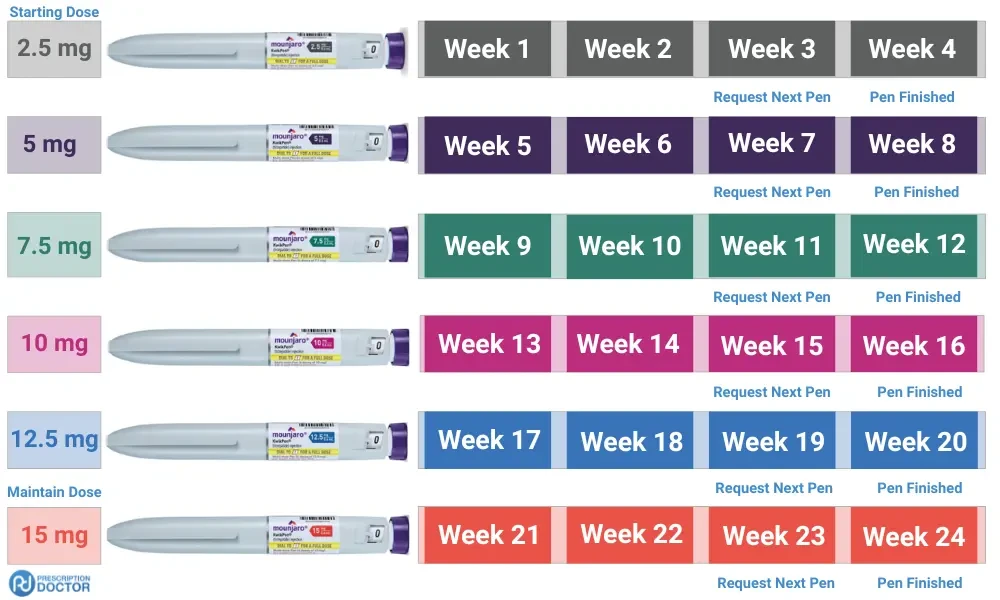How Long Do Mounjaro Side Effects Last?
Mounjaro (tirzepatide) is one of the UK’s most popular weight loss injections and is widely considered a safe and effective way to lose weight. Research reports that people on Mounjaro can lose over 20% of their total body weight, significantly reducing their long-term risk of weight-related health conditions. However, like all medications, Mounjaro also has the potential to cause side effects.
The most common side effects of Mounjaro are gastrointestinal symptoms, which are thought to affect the majority of people using weight loss injections. These side effects are usually mild to moderate and tend to improve with time, but they can be uncomfortable to live with. So, how long do Mounjaro side effects last, and is there anything you can do to reduce them in the meantime?
START YOUR MOUNJARO CONSULTATION TODAY
Potential Side Effects of Mounjaro Injections
Gastrointestinal symptoms are the most common side effects of Mounjaro and include nausea, vomiting, diarrhoea, constipation, and indigestion. In rare cases, Mounjaro treatment can trigger serious health problems affecting the pancreas, kidneys, and gallbladder. People using Mounjaro also have a higher risk of hypoglycemia (very low blood sugar), especially if they also use anti-diabetic medications.
The side effects of Mounjaro are typically mild to moderate and improve within days of treatment initiation and dose increases. Severe or persistent side effects may indicate a more serious medical issue and should be reported to a licensed clinician.
When Do Mounjaro Side Effects Start?
The gastrointestinal side effects of Mounjaro usually occur at the start of treatment and around dose increases. The exact timing of side effects varies between individuals, but some people may experience symptoms from the day of their first injection.

Mounjaro Day 1 Side Effects
Gastrointestinal symptoms usually begin soon after people start using Mounjaro, and may even show up on day 1 of treatment. Nausea is the most common side effect of Mounjaro, affecting over 20% of users. Another frequent early side effect of Mounjaro is diarrhoea, which is reported in more than 16% of people using this medication.
Mounjaro Week 2 Side Effects
The side effects of Mounjaro usually flare up around the start of treatment and when the user increases their dose. They are reported to diminish over time, so by week 2 of treatment, many Mounjaro users will have noticed a significant improvement in their symptoms.
Mounjaro Dose Increase Side Effects
Mounjaro side effects are dose-dependent, and higher doses are associated with a greater incidence of gastrointestinal symptoms. As a result, most people will notice an upswing in side effects every four weeks when they increase their dose. However, these will fade with time as they do at the start of treatment.
The Mounjaro dosage schedule is as follows:

Side Effects of Coming Off Mounjaro
There are no reported withdrawal symptoms of coming off Mounjaro. However, people coming off weight loss injections typically experience increased hunger, as the appetite-suppressing effects of the drugs wear off. This can lead to weight regain in the absence of a calorie-controlled diet and regular exercise.
The side effects of tirzepatide (the active ingredient in Mounjaro) are comparable to those of other popular weight loss injections, like semaglutide (Wegovy). Therefore, people switching from Wegovy to Mounjaro (or vice versa) are unlikely to experience any new symptoms. If you want to switch from one weight loss medication to another, only do so under the guidance of a licensed clinician.
Wegovy
- Approved Weight Loss treatment
- Weekly injection
- Reduces risk of heart attack & stroke
How Long Do the Side Effects of Mounjaro Last
The side effects of Mounjaro are transient, meaning they typically occur at the start of treatment and during dose escalation, then decrease over time. Symptoms may last for days or weeks, but what can you expect in the short, medium, and long term?
Mounjaro Short-Term Side Effects
Gastrointestinal symptoms like nausea, vomiting, and diarrhoea are most common during the initial weeks of Mounjaro treatment. They begin soon after the first injection, and often flare up again during dose increases. Other short-term side effects of Mounjaro may include:
- Indigestion
- Constipation
- Abdominal pain
- Decreased appetite
These symptoms are usually mild to moderate and get better within days or weeks of starting treatment. However, severe or persistent vomiting and diarrhoea can lead to dehydration, so consult a healthcare professional if your condition doesn’t improve.
Mounjaro Medium-Term Side Effects
Most of Mounjaro’s side effects taper off within days or weeks of starting treatment, and many people will have little or no symptoms in the medium term. However, it’s common for gastrointestinal problems to re-emerge every 4 weeks in coincidence with dose escalations. This is because the side effects of tirzepatide are dose-dependent, and often flare up at higher doses.
Fortunately, research has demonstrated how gradual dose escalation can reduce the impact of Mounjaro’s side effects. Slowly increasing your dosage in line with the approved schedule can make gastrointestinal symptoms more tolerable, even at higher doses. Many people who have reached the maintenance (i.e., highest possible) dose of Mounjaro find their symptoms fade completely after a while.
Mounjaro
- Approved Weight Loss Treatment
- Suitable for adults with a BMI of +30kg/m²
- Pre-filled injection pen
Mounjaro Long-Term Side Effects
The majority of Mounjaro’s side effects are temporary and primarily affect the gastrointestinal system. However, in rare cases, weight loss injections can lead to more serious long-term health complications. These are thought to affect under 1% of people using Mounjaro, and may include:
- Gallstones
- Inflammation of the gallbladder
- Pancreatitis
- Severe hypoglycemia
Serious medical complications are often associated with other risk factors. For example, people who use anti-diabetic medications (like sulfonylureas or insulin) alongside Mounjaro are more likely to develop hypoglycemia. People who use tobacco and those with a history of gallbladder disease or acute pancreatitis are more likely to develop pancreatitis on Mounjaro.
If you experience severe or persistent side effects on Mounjaro, seek the advice of a licensed clinician.
How to Deal with Mounjaro Side Effects
The most common side effects of Mounjaro are gastrointestinal symptoms like nausea, vomiting, and diarrhoea. These are usually mild to moderate and short-lived, but can be uncomfortable to live with.
Fortunately, there are measures you can take to manage the side effects of Mounjaro. For example, you may be able to minimise nausea and vomiting by:
- Eating slowly and only when hungry
- Eating small portions
- Avoiding lying down after eating
- Avoiding physical activity after eating
- Not eating too close to bedtime
Optimising your diet for Mounjaro treatment may also help to counteract gastrointestinal symptoms. Choose easily digestible, low-fat foods and sip water and other clear fluids throughout the day. Foods to avoid on Mounjaro include:
- Spicy foods
- Sugary foods
- Foods high in fat
- Dressings
- Canned foods

Diarrhoea is another common side effect of Mounjaro, and may be alleviated by:
- Temporarily avoiding high-fibre foods (like grains, nuts, seeds, pulses, vegetables and fruits with the skin on)
- Increasing hydration with water and other clear drinks
- Avoiding dairy products, coffee, and alcohol
If your side effects are severe, persistent, or uncomfortable despite taking measures to improve them at home, contact a healthcare professional for guidance. Clinicians may recommend over-the-counter remedies or advise those with troublesome side effects to take a lower dose of Mounjaro.
Frequently Asked Questions
The decision to use weight loss injections requires careful consideration, and you may still have questions about their potential side effects. Common topics of discussion around these medications include other possible side effects, injection site reactions, and when to seek medical advice.
Is Fatigue a Side Effect of Mounjaro?
Fatigue is not officially listed as a side effect of Mounjaro. Regardless, you may have heard people say they feel unusually tired on weight loss injections, and one clinical study reported that 5% of participants experienced fatigue during tirzepatide treatment.
Feeling tired from weight loss injections is likely due to a significantly reduced calorie intake. Fortunately, substantial weight loss is often accompanied by increased energy levels, particularly among individuals who regularly engage in exercise.
How Long Do Injection Site Reactions Last?
Injection site reactions are a common occurrence among people using weight loss injections. They typically involve redness, pain, itching, swelling, or warmth in the area you have injected Mounjaro.
These reactions are thought to be dose-dependent and are more common among people using higher doses of Mounjaro (10 mg or 15 mg). Injection site reactions are usually mild or moderate in severity and may resolve themselves within days. However, people’s experiences vary, and some skin irritation may persist for a few weeks.
When Should I Seek Medical Care For Mounjaro Side Effects?
Most of the side effects of Mounjaro are mild to moderate and get better with time. Sometimes, however, symptoms can be an early warning sign of a deeper medical problem and should be addressed by a healthcare professional.
You should contact a licensed clinician if your side effects are severe or if they don’t get better within a few days. This is also true for gastrointestinal symptoms, as persistent vomiting and diarrhoea can lead to dehydration and other health complications.
Effective Weight Loss Support You Can Rely Upon
If you’re considering adding Mounjaro or another treatment to your weight loss regimen, you’ll likely want as much information as possible about how it works and its potential impact on your body. This is where Prescription Doctor can help.
From answering questions such as “How long do Mounjaro side effects last?” to comparing weight loss injections, we’re here to support you every step of the way. Our clinicians will work with you to recommend the most suitable medication for your specific circumstances and will check in periodically to assess your progress. A holistic service designed with you in mind.
We also provide a comprehensive reference library of information about Mounjaro. This includes guides on how to use the pens, where to inject them, suggested exercise routines, and diet advice. You can also read reviews from real Mounjaro customers and view some impressive before-and-after results, providing a good idea of what you can expect from the treatment.
All orders with Prescription Doctor are dispatched in plain packaging for total privacy. Requests approved before 3pm on a weekday are also eligible for next-day delivery, so you can have prompt access to your medication. This is just part of our commitment to take all the hassle out of healthcare.
Ready to take your first steps with Mounjaro? Request a consultation today.
Sources
- PubMed (2024): The Body Weight Reducing Effects of Tirzepatide in People with and without Type 2 Diabetes: A Review on Efficacy and Adverse Effects.
- European Medical Journal (2025): Weighing up the Risks: GI Side Effects of Semaglutide vs Tirzepatide.
- FDA: Mounjaro Highlights of Prescribing Information.
- DailyMed: Mounjaro.
- UK Government (2024): GLP-1 receptor agonists: reminder of the potential side effects and to be aware of the potential for misuse.
- PubMed (2023): Tirzepatide-Induced Gastrointestinal Manifestations: A Systematic Review and Meta-Analysis.
- PubMed (2024): Efficacy and safety of once-weekly tirzepatide for weight management compared to placebo: An updated systematic review and meta-analysis including the latest SURMOUNT-2 trial.
- PubMed (2023): Adverse Events Related to Tirzepatide.
- PubMed (2022): Weight regain and cardiometabolic effects after withdrawal of semaglutide: The STEP 1 trial extension.
- PubMed (2025): Tirzepatide Versus Semaglutide for Weight Loss in Overweight and Obese Adults: A Systematic Review and Meta-Analysis of Direct Comparative Studies.
- PubMed (2020): Efficacy and tolerability of tirzepatide, a dual glucose‐dependent insulinotropic peptide and glucagon‐like peptide‐1 receptor agonist in patients with type 2 diabetes: A 12‐week, randomized, double‐blind, placebo‐controlled study to evaluate different dose‐escalation regimens.
- NIH (2024): Tirzepatide.
- Science Direct (2025): Predictors of acute pancreatitis in patients treated with GLP-1 receptor agonists for weight management.
- PubMed (2022): Clinical Recommendations to Manage Gastrointestinal Adverse Events in Patients Treated with GLP-1 Receptor Agonists: A Multidisciplinary Expert Consensus.
- Taylor & Francis Online (2021): Managing the gastrointestinal side effects of GLP-1 receptor agonists in obesity: recommendations for clinical practice.
- PubMed (2025): Patient Experience of Treatment with Tirzepatide for Weight Management: Exit Interviews from SURMOUNT-4.
- PubMed (2021): Injection-Site Nodules Associated With Once-Weekly Subcutaneous Administration of Semaglutide.
- PubMed (2023): A systematic review of the safety of tirzepatide-a new dual GLP1 and GIP agonist - is its safety profile acceptable?
Authored By

Leanne Edermaniger
Medical Content WriterPublished on: 21/05/2024 Re-Published on: 17/09/2025
Reviewed By

Mohamed Imran Lakhi
MPharm - Lead PharmacistReviewed on: 17/09/2025
© 2013 - 2026 Al Muhsineen Limited. All Rights Reserved. Registered Pharmacy: 34 Halliwell Road, Bolton BL1 8RL. Registered Office: 254 First Floor, Shearbrow, Blackburn, England, BB1 8DS








